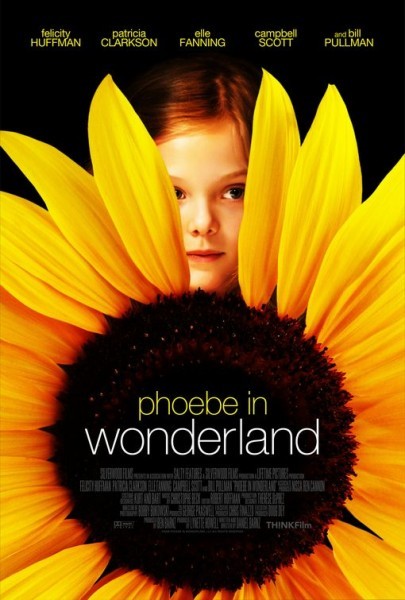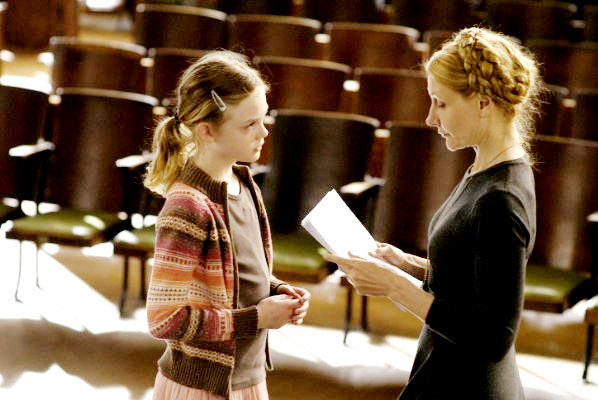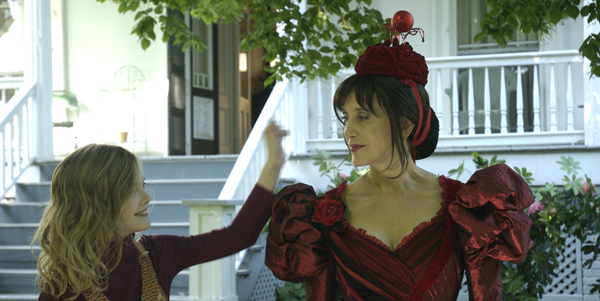

Director: Daniel Barnz, 2008. (PG-13)
Phoebe in Wonderland is a low-budget independent film from first-time writer-director Barnz. It is also the debut film for Elle Fanning, the younger sister of Dakota Fanning. It opened in 11 theaters in 2009 and grossed a paltry $72,000 at the box office. An interesting story of uniqueness hidden amidst conventionality and the rules of normalcy, it could have been developed better, and its conclusion leaves us wondering somewhat.
Phoebe (Fanning) wants to be Alice. But so do all the other girls in her drama class at school. After all, Alice is the heroine and main character in the play, Alice in Wonderland. But there is something different about 9-year-old Phoebe. She lives in her own wonderland of sorts. Drama teacher Miss Dodge (Patricia Clarkson, Elegy) recognizes this, as Phoebe is the only kid in the auditions whose eyes light up when she speaks the lines, and she gives Phoebe the part.
 As the movie develops it becomes apparent that there is something strange about Phoebe. Her parents are both writers. Her dad Peter (Bill Pullman) is always working on a book. Her mom Hillary (Felicity Huffman) wants to be working on her book, a revision of her dissertation on Alice. However, she has writer's block and blames it on her two girls. She cannot write even a sentence a day. With such distracted and inattentive parents, it seems of little surprise that Phoebe, an Alice fan, resorts to living in her dreams.
As the movie develops it becomes apparent that there is something strange about Phoebe. Her parents are both writers. Her dad Peter (Bill Pullman) is always working on a book. Her mom Hillary (Felicity Huffman) wants to be working on her book, a revision of her dissertation on Alice. However, she has writer's block and blames it on her two girls. She cannot write even a sentence a day. With such distracted and inattentive parents, it seems of little surprise that Phoebe, an Alice fan, resorts to living in her dreams.In her waking dreams she sees Alice, along with the Red Queen, the White Rabbit and other characters from Lewis Carroll's famous story. But these characters become more real to her than her teachers and fellow students. Her parents at first think this is a sign of Phoebe's creativity and unique imagination. But as her behavior becomes more and more odd, Hillary takes her to see a psychiatrist. She seems to be at risk of falling through her own looking glass.
At school, it is clear that Phoebe is an outsider. When the teachers describe the rules of the classroom, unchanging year to year, Phoebe seems to challenge their authority. She is unwilling to simply be part of the crowd. Of course, this targets her for bullying and she reacts. It is her reaction, not the bully's, that gets noticed and gets her in trouble. Rules are her achilles' heel.
 Rules form the core theme of Barnz' film. Unchanging rules form a sort of prison for Phoebe. She explains this to her shrink, when she describes her "conversations" with the Red Queen. When asked what they discuss, she replies: "Wonderland. How nice it is to have a place where things aren't fixed. It's all the opposite there, you know. It'd be nice if . . . if it were the same here."
Rules form the core theme of Barnz' film. Unchanging rules form a sort of prison for Phoebe. She explains this to her shrink, when she describes her "conversations" with the Red Queen. When asked what they discuss, she replies: "Wonderland. How nice it is to have a place where things aren't fixed. It's all the opposite there, you know. It'd be nice if . . . if it were the same here."So what are the benefits of rules? Obviously, they provide the basis for society to function. Some are unspoken, simple expectations that we learn to follow: be home by midnight; clean up after yourself in the kitchen; follow the musical score. Others are written and communicated so we fully understand their meaning: no smoking;don't litter; fasten seatbelts. Even games have rules. Without them we would not know how to play, and there would be no order and no fun. Rules can be arbitrary. But rules usually have a foundation. Some are elevated to laws with criminal consequences if broken. These, too, can lack a moral foundation, although many are rooted in morality, such as laws against stealing (Exod. 20:15) and killing (Exod. 20:13). There is clear biblical support for these.
Society expects us to adhere to most rules. And we usually try, even if we fail often. We may have every good intention but lack implementation. The Old Testament Chronicler knew this. When King Hezekiah wanted to reestablish the Passover for the Israelite nation, many came from far away to worship.
Although most of the many people who came from Ephraim, Manasseh, Issachar and Zebulun had not purified themselves, yet they ate the Passover, contrary to what was written. But Hezekiah prayed for them, saying, 'May the LORD, who is good, pardon everyone who sets his heart on seeking God—the LORD, the God of his fathers—even if he is not clean according to the rules of the sanctuary' (2 Chron. 30:18-19).Some rules can be broken and forgiven.
Phoebe's predicament is different, as she explains: "It's a voice in your head that makes you do the opposite of what you're supposed to do. It makes you want to break rules. But sometimes breaking rules is good." She seems constrained to go against whatever rules are established. This sounds like the apostle Paul.
In Romans 7 Paul breaks off his theological treatise to discuss his personal spirituality. "We know that the law is spiritual; but I am unspiritual, sold as a slave to sin. I do not understand what I do. For what I want to do I do not do, but what I hate I do" (Rom. 7:14-15). He cannot do what he knows is good and right. He is led to break the rules and do what is wrong, what he hates: sin. This is often true for us, too. We know the rules; we know what is right. Yet we go right on doing what is wrong, disregarding the rules with the rationalization that we will ask forgiveness if and when we are caught. Yes, we know God is a forgiving God (Mic. 7:18). But he would prefer we enjoy his blessing and company by doing right and walking with him, following Jesus, than to see us break fellowship and forgive us later.
 All the characters in Phoebe in Wonderland are abnormal in some way. Phoebe has her imaginative friends and rule-breaking. Her mother is distracted and depressed. Her father is uninvolved and aloof. The teachers are almost automatons, reciting and policing the rules. The principal is a wimp, afraid to assert his authority, willing only to go along with the teachers. And Miss Dodger is an oddball teacher. Her eccentricities extend to allowing the students to direct their own play. She refuses to answer their questions but turns each question back to the children, forcing them to come up with their own answers. But her unusual teaching methods result in problems, both for her and for Phoebe.
All the characters in Phoebe in Wonderland are abnormal in some way. Phoebe has her imaginative friends and rule-breaking. Her mother is distracted and depressed. Her father is uninvolved and aloof. The teachers are almost automatons, reciting and policing the rules. The principal is a wimp, afraid to assert his authority, willing only to go along with the teachers. And Miss Dodger is an oddball teacher. Her eccentricities extend to allowing the students to direct their own play. She refuses to answer their questions but turns each question back to the children, forcing them to come up with their own answers. But her unusual teaching methods result in problems, both for her and for Phoebe.Miss Dodger, though, expounds a second theme of the film, in her encouraging words to Phoebe:
At a certain part in your life, probably when too much of it has gone by, you will open your eyes and see yourself for who you are. Especially for everything that made you so different from all the awful normals. And you will say to yourself, "But I am this person." And in that statement, that correction, there will be a kind of love.The uniqueness of individuals. When we are young we want to fit in, to avoid standing out and being picked on, by teachers or students.We want to be "normal". But what is normal? Who defines it? Who, if any, is actually normal? That seems to be the point. None of the characters appear normal. Rather, God has made us different from everyone else in the world. We are unique. There is no one else exactly like you. And we can be glad for this. It makes each one of us special. We can celebrate our uniqueness. Of course, there is a level of normality, a boiling down to the lowest common denominator of humanity. But the real value of each one of us is in the flair we bring because "I am this person". When we can accept this and love ourselves, a true biblical concept (Matt. 22:39), then we have grasped David Barnz' point and understood his picture. This takes maturity. We don't always get there.
Copyright ©2010, Martin Baggs

Oh, I saw that movie very interesting!
ReplyDeleteCharles,
Boston
I'm confused. Did you already see this movie, or is it coming up next Saturday? I'd love to see it.
ReplyDeleteMolly,
ReplyDeleteI already saw it. Why did you think it was coming up next Saturday? I apologize for any confusion. You can get it from the Multnomah County Library.